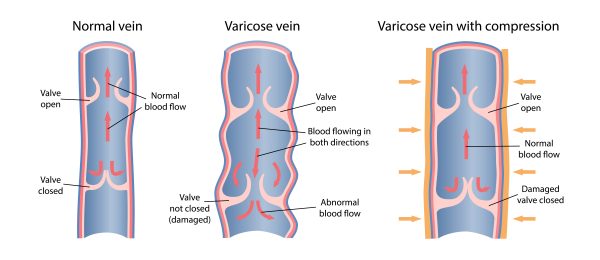When we’re younger, varicose veins may be a purely cosmetic problem. Seeking treatment for these veins would likely be to eliminate the unsightly bluish-purplish lines that appear on the skin’s surface. As we get older, however, varicose veins can get more complicated – and more prevalent. In fact, it’s estimated that about 65 per cent of adults over the age of 60 have at least one symptom related to varicose veins in their legs. Today, we want to explore the possible complications to understand should people 65+ treat their varicose veins.
What causes varicose veins?
Varicose veins form when weak or damaged vein valves are no longer able to sufficiently pump blood around the body and back up to the heart. Generally, this happens in the legs, due to gravity and the effects that sitting, or standing, for long periods has on the legs. The blood becomes pooled in the vein, eventually swelling and becoming what is commonly recognised as a varicose vein.
To read more why veins form in the legs: Why Are Varicose Veins Primarily Found in the Legs.
Should people 65+ treat their varicose veins?
Have you been putting off getting varicose vein treatment because you feel that you’re past the age to do anything about it? If so, you’ll be pleased to know that there is no age limit when it comes to treating venous disorders!
As it turns out, age is not the most important factor for determining your candidacy for vein treatment. It’s actually the state of your physical health that matters. If you’re a healthy, active woman or man in your sixties or even seventies, you may be a good candidate for varicose vein treatment.
When you should treat varicose veins
It’s important to remember that treating symptomatic varicose veins does not depend on your age. Rather, you should seek an assessment, diagnosis and treatment from a qualified and experienced vein specialist (Phlebologist) if you’re experiencing any of the following:
- Discomfort: Symptoms such as burning, throbbing, pain or heaviness in your legs can mean poor circulation that can detract from your quality of life. Non-surgical treatment options can help you live a more comfortable and happy life.
- Blood clots: If you have varicose veins there’s also a chance you can develop a dangerous condition called DVT or deep vein thrombosis. These blood clots are not visible to the naked eye and can only be detected by a vein specialist with the help of ultrasound imagery.
- Bleeding and slow healing time: Since varicose veins are close to the skin’s surface, bleeding can be difficult to stop in the event of a small cut or injury. Healing time is also slowed for this reason. Treating the veins can often improve blood circulation and bleeding problems.
- Leg ulcers: Untreated varicose veins can lead to varicose ulcers. These are chronic sores on the lower legs that are slow to heal and can lead to complications over time. Addressing your varicose veins, even later in life, can improve or even prevent leg ulcers.
- Skin infection: Varicose veins can increase your risk of developing a skin infection. Particularly if your legs are experiencing any pain, burning or throbbing as well, you should see a doctor right away. They may recommend treating your varicose veins to reduce the chance of a serious infection.
The diagram above demonstrates the benefits of wearing compression stockings for varicose veins. Compression stockings are available to purchase from Bauerfeind.
Benefits of having your varicose veins treated over age 65+
If you’ve always been an active person but your vein condition has slowed you down due to the pain and discomfort, having your vein issues treated can restore your ability to become active once again. You’ll be able to enjoy your favourite activities such as walking, running, tennis or cycling with the help of minimally-invasive treatments such as sclerotherapy, Endovenous ablation (EVA), Radiofrequency ablation (RFA) or VenaSeal “superglue.”
Remember, age is not a barrier to good treatment outcomes.
Seek expert advice
The doctors at The Vein Institute specialise in varicose vein treatment. We offer patients a comprehensive treatment program to treat varicose veins, with non-surgical laser treatment techniques. The benefits of laser treatment to patients are;
- Walk-in walk-out treatment
- 98% success rate
- Extremely effective
- Can be performed at a clinic (no hospitalisation)
- No general anaesthetic
- Medicare rebates apply
- No downtime or time away from work
Call us on 0420 102 637, or fill out our booking request form.



